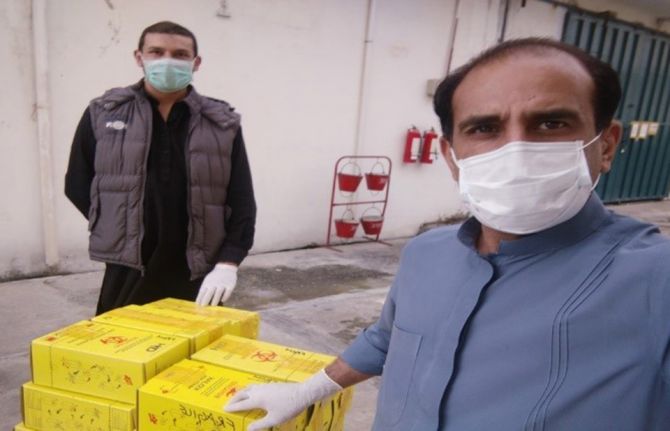

Feature Story
“We must ensure that HIV treatment adherence is not compromised”—keeping people in Pakistan on HIV treatment
29 April 2020
29 April 2020 29 April 2020It was a rainy night when Asghar Satti, the National Coordinator of the Pakistan Association of People Living with HIV (APLHIV), went home after spending a busy day at the office.
That day, he had received a call from a man in Karachi, Pakistan, who is living with HIV. He was worried that he was running low on his supply of antiretroviral therapy, with only nine days of treatment left. That call was one of many such calls that he had received since the beginning of the lockdown put in place after the first case of COVID-19 was identified in Pakistan in late February.
“We need to do something that really benefits the community, we must ensure that HIV treatment adherence is not compromised,” Mr Satti thought.
In order to do just that, the APLHIV set up its Emergency Response Cell (ERC) in March. The ERC is working to ensure that everyone on HIV treatment gets an adequate supply of antiretroviral therapy, often delivered to their door.
Developed by the APLHIV, together with UNAIDS and Pakistan’s National AIDS Control Programme Common Management Unit for AIDS, TB and Malaria, the ERC’s Costed Contingency Plan groups all people living with HIV who are on treatment into three groups: red (people with a supply of antiretroviral therapy for less than two weeks); yellow (people with a supply of antiretroviral therapy for a month); and green (people with a supply of antiretroviral therapy for more than a month). These groups are then used to prioritize who receives packages of antiretroviral therapy, provided by the National AIDS Control Programme, through APLHIV and the Provincial AIDS Control Programme. The National AIDS Control Programme, through its Procurement and Supply Management Unit, provides packages of antiretroviral therapy to APLHIV, which are delivered by APLHIV through courier services to the doorsteps of people living with HIV who are unable to reach treatment centres.
As well as ensuring HIV treatment, other services provided by APLHIV include education for people living with HIV and key populations on COVID-19—more than 70 000 short messages in the local language on how to prevent COVID-19 were sent during the first four weeks of the lockdown. APLHIV, in close collaboration with the Provincial AIDS Control Programme, is also monitoring the 45 centres nationwide that provide antiretroviral therapy, checking that they have sufficient stocks of treatment and that people living with HIV are being provided with services without stigma and discrimination.
With a grant from the Global Fund to Fight AIDS, Tuberculosis and Malaria, APLHIV has provided nutritional support to more than 3200 people living with HIV in need. “You can never imagine what this support means to me, when I don’t have a single penny to feed myself or my siblings. The help we reached is a blessing from God,” one of the recipients said.
APLHIV, which has more than 15 000 people living with HIV from across Pakistan in its network, has also linked around 4000 people living with HIV with one of the social protection programmes launched by the government to support people in need during the COVID-19 pandemic.
“APLHIV will continue operating the Emergency Response Cell until the COVID-19 pandemic ends in the country,” Mr Satti said.
“Working with the community with APLHIV is always fulfilling. The work almost always centres around finding local solutions to effectively respond to the evolving needs of the people, of the community. It is not always easy, but with constant dialogue, innovative ideas are born and then nurtured. This multimonth antiretroviral therapy dispensing and the simple use of different colours to depict level of antiretroviral therapy available, which people can easy understand, is another home-grown innovation we are proud of,” said Maria Elena Filio Borromeo, UNAIDS Country Director for Pakistan and Afghanistan.



